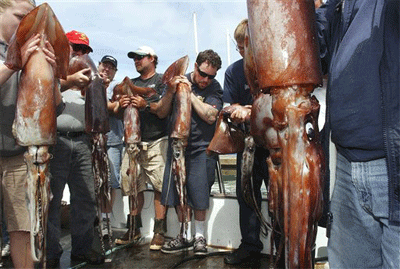July 27, 2007
Chiperoni's SoCal Style

Big news in the food chain off the coast of Callifornia:
MONTEREY, Calif. (AP) - Jumbo squid that can grow up to 7 feet long and weigh more than 110 pounds is invading central California waters and preying on local anchovy, hake and other commercial fish populations, according to a study published Tuesday.I suggest we trade off the fish sticks for calamari sauteed in onion and mopped up with a nice loaf of crispy chibata bread... or a seafood paella heavy with calamari with a few gambas and mussels thrown in for color... or chiperoni's: crispy fried, lightly breaded, infant squid. With a tall beer. There's no better way to bump a rogue species off the upper part of the food chain than by eating its young. Posted by Dennis at July 27, 2007 2:58 AMAn aggressive predator, the Humboldt squid?or Dosidicus gigas?can change its eating habits to consume the food supply favored by tuna and sharks, its closest competitors, according to an article published in the Proceedings of the National Academy of Sciences journal.
"Having a new, voracious predator set up shop here in California may be yet another thing for fishermen to compete with," said the study's co-author, Stanford University researcher Louis Zeidberg. "That said, if a squid saw a human they would jet the other way."The jumbo squid used to be found only in the Pacific Ocean's warmest stretches near the equator. In the last 16 years, it has expanded its territory throughout California waters, and squid have even been found in the icy waters off Alaska, Zeidberg said.
Zeidberg's co-author, Monterey Bay Aquarium Research Institute senior scientist Bruce Robison, first spotted the jumbo squid here in 1997, when one swam past the lens of a camera mounted on a submersible thousands of feet below the ocean's surface.
More were observed through 1999, but the squid weren't seen again locally until the fall of 2002. Since their return, scientists have noted a corresponding drop in the population of Pacific hake, a whitefish the squid feeds on that is often used in fish sticks, Zeidberg said.
"As they've come and gone, the hake have dropped off," Zeidberg said. "We're just beginning to figure out how the pieces fit together, but this is most likely going to shake things up."Before the 1970s, the giant squid were typically found in the Eastern Pacific, and in coastal waters spanning from Peru to Costa Rica. But as the populations of its natural predators?like large tuna, sharks and swordfish?declined because of fishing, the squids moved northward and started eating different species that thrive in colder waters.
Local marine mammals needn't worry about the squid's arrival since they're higher up on the food chain, but lanternfish, krill, anchovies and rockfish are all fair game, Zeidberg said.
A fishermen's organization said Tuesday they were monitoring the squid's impact on commercial fisheries.
Leave a comment